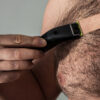Is your child losing hair? It is high time to start treatment to cure such a problem. There are different causes of hair loss in children and teenagers. A doctor will perform a comprehensive interview to remove hair loss symptoms and start treatment. You should not underestimate the problem because it will grow bigger with time and have a negative effect on the psyche. The vicious reactions of peers can lead to disrupted social relationships and lack of empathy.
Causes of hair loss in children
Excessive hair loss can occur even in children. It can affect a particular area or cover the whole body. In some cases it has been confirmed that alopecia (or hair loss) in children is linked to genetic factors. The disease can be innate or acquired i.e. caused by other diseases the patient suffered from in life. Skin disease such as dermatophytosis can also weaken hair. In addition, acute stress or vitamin deficiency can weaken hair and cause hair loss. Children can experience alopecia areata resulting from an unstable immune system. The body attacks its own follicles which are weakened and do not grow as fast as they are supposed to. Everyday hair style such as braids or updos can significantly weaken the follicles. Children can also experience hormonal imbalance such as thyroid dysfunction.
Causes of hair loss in teenagers
Teenagers at puberty are more and more frequently visiting hair restoration clinics. Hormonal changes can weaken the body and lead to hair loss. The most common cause of alopecia are medications mainly antibiotics, hormonal drugs or contraceptives. Chronic stress and improper hair care can also weaken follicles. Genetic factors and other concomitant diseases can cause hair loss in teenagers. In addition, sleep deprivation can weaken the whole body. An unhealthy diet including sweets and fast food can also cause excessive hair loss the same as dietary restrictions used to reduce body weight.
Hair loss diagnosis
Excessive hair loss in children and teenagers should not be underestimated. Every disorder has its cause and a doctor will start treatment to find it. Our specialists will order additional tests for hormone levels and will learn a detailed medical history about the patient’s lifestyle, eating habits and diseases also in his/her family. On the basis of test results and the above details a doctor will be able to determine the problem’s background and the patient’s reaction to lifestyle and habits. A doctor can also perform trichoscopy to assess hair structure and condition of the follicles.
Hair loss treatment in children and teenagers
Hair loss treatment methods are different and depend on the cause of alopecia. In some cases it is sufficient to cure a disease e.g. dermatophytosis to remove a hair loss problem. In case of hormonal disorders a doctor will balance the hormone levels. Patients with alopecia areata can use ointments and topical creams or undergo therapy using anti-inflammatory injections into the scalp. In addition, a medication such as minoxidil is effective in stimulating the functioning follicles.
The support of parents and peers is crucial in the treatment therapy. A doctor in our clinic will try to find the complex solution to the problem. One of the options is a hair transplant which is a minor invasive procedure.
Treatment description
During hair transplant surgery a doctor extracts follicles from an area on a patient’s body and transplants them into the recipient area. Transplanting the patient’s material allows avoiding transplant rejection and allergy reaction. The clinic offers FUE hair transplant surgery which involves extracting single follicles. They are extracted with a special metal tool that produces no scars. Our specialist extracts follicles of the highest quality and transplants them into the recipient area. The effects highly depend on the doctor’s experience.
Who can undergo hair transplant surgery?
A recommendation for hair transplant surgery is if a person has alopecia or thinning hair. Patients who do not feel comfortable because of hair loss are welcome in our clinic. Our hair transplant methods are not too invasive so even young patients can undergo surgery.
Should the treatment be repeated?
In most cases it is sufficient to perform one surgery which allows the transplantation of many follicles. However, in patients with advanced alopecia, surgery should be repeated. Proper care of transplanted follicles ensures that they will grow as expected by a doctor.
Hair transplant results
Hair transplant surgery conducted by an experienced specialist will bring spectacular results. New follicles will be strong because they were chosen by a doctor. Results can be assessed 6 months after the surgery during a follow-up visit. A doctor will check the condition of the transplanted follicle and recommend additional hair care instructions if necessary.
Hair transplant contraindications
People suffering from blood clotting disorders, pregnant and breastfeeding women are not recommended to undergo hair transplant surgery. On your first visit a doctor will carry out a detailed medical interview to learn the patient’s health condition and qualify him/her for the surgery.
How to prepare for the surgery?
The patient should do tests arranged by a doctor to give information about the patients’ health condition. It is recommended to avoid blood-thinning medications a few weeks before surgery. On the day of surgery you should have a light breakfast and not drink coffee. You should bring a hooded sweatshirt or a loose cap to protect your hair from environmental conditions. After the treatment you should follow the doctor’s instructions in every detail.





